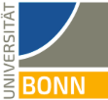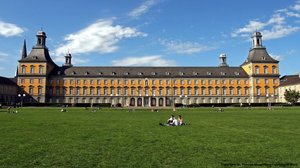
The University of Bonn was established over 200 years ago and remains one of Germany’s most distinguished institutions for research and higher education. The University of Bonn is one of the 11 institutions belonging to the prestigious ‘Universities of Excellence’ in Germany.

Its outstanding reputation is further reflected in the Shanghai Academic Ranking of World Universities 2020 with position 87 in the world and position 4 nationally. This is also due to the outstanding performance of the University of Bonn in gaining funding through the Excellence Initiative set out by the Federal Government and the German Research Foundation (DFG): in 2018 the University of Bonn acquired six Clusters of Excellence. These clusters include immunology, mathematics, dependency research, robotics, economics and quantum physics and reflect the subject breadth and depth of Bonn University as a highly dynamic scientific think tank.

The University of Melbourne was established in 1853 and is a public-spirited institution that makes distinctive contributions to society in research, learning and teaching and engagement. It is consistently ranked among the leading universities in the world, with international rankings of world universities placing it as number 1 in Australia and number 31 in the world (Times Higher Education World University Rankings 2021). With its strong research performance and excellence in learning and teaching, the University of Melbourne is home to the largest cohort of research students amongst all Universities in Australia and many of Australia's, and some of the world's most distinguished medical researchers, including recipients of the Nobel Prize for Medicine, such as Peter Doherty, and the 2019 Lasker Awardee Jacques Miller.

The University of Melbourne is located within a cluster of collaborating medical research institutes, including the Peter Doherty Institute for Infection and Immunity, the Royal Melbourne Hospital, the Peter MacCallum Cancer Center, the Florey Institute of Neuroscience and Mental Health, and the Walter and Eliza Hall Institute. Currently, there are over 10,000 scientists, doctors, technicians, and nurses and this number is expected to grow over time.

Research focus: discovery research; diagnosis, surveillance and investigation of infectious disease outbreaks
The Peter Doherty Institute for Infection and Immunity is a joint venture between The University of Melbourne and The Royal Melbourne Hospital where leading scientists and clinicians collaborate to improve human health globally.
Research focus: medical, agricultural and environmental biotechnology
The Bio21 Institute of Molecular Science and Biotechnology focuses on basic science and applied biotechnology. The Bio21 Institute is based at the University of Melbourne.
Research focus: cancer, immune health and infection, development and healthy ageing, new medicines and advanced technologies, computational biology
The Walter and Eliza Hall Institute is Australia's oldest medical research institute committed to solving the most complex health problems and to make transformative discoveries for cancer, infectious and immune diseases, developmental disorders and healthy ageing.
Research focus: inflammation, cancer, reproductive health and children’s health
The Hudson Institute is a leading Australian translational medical research institute and partnered with Monash University and Monash Health. The Hudson Institute is recognised internationally for discovery science and translational research into inflammation, reproductive health and pregnancy, infant and child health and cancer.
Research focus: cancer, cardiovascular disease, development and stem cells, infection and immunity, metabolism, diabetes and obesity, and neurosciences
Based at Monash University in the Faculty of Medicine, Nursing and Health Sciences, the BDI is one of the largest biomedical research institutes in the southern hemisphere. The Institute combines more than 120 research teams from multiple disciplines into six global health priority areas to tackle global biomedical challenges.

Research focus: immunology
Situated on the medical campus of the Friedrich-Wilhelms-Universität Bonn the IMMEI aims to better understand the underlying molecular and cellular mechanisms controlling local immune responses that lead to the development of tolerance or immunity.

Research focus: basic biomedical research
The LIMES focuses on the regulation of lipid metabolism and the immune system in health and disease, and to decipher the signalling processes that take place both within and on biomembranes.

Research focus: clinical chemistry and clinical pharmacology
The ICCCP includes the areas of Clinical Chemistry and Clinical Pharmacology through research, teaching, and patient care. It is also home to the central laboratory of the University Hospital Bonn, a phase I clinical trial unit, and its various research groups incorporated into the institute.
Research focus: Tumor Microenvironment and Cancer Immunotherapy
The IEO investigates how the immune system crosstalks with tumor cells such as melanoma. This knowledge is critically needed to improve modern therapeutic approaches.
Research focus: hematology and oncology
The Internal Medicine III at the University Clinic Bonn focuses on the diagnosis and therapy of blood and bone marrow diseases (hematology) as well as the development and treatment of solid tumors and tumor-related diseases (oncology).